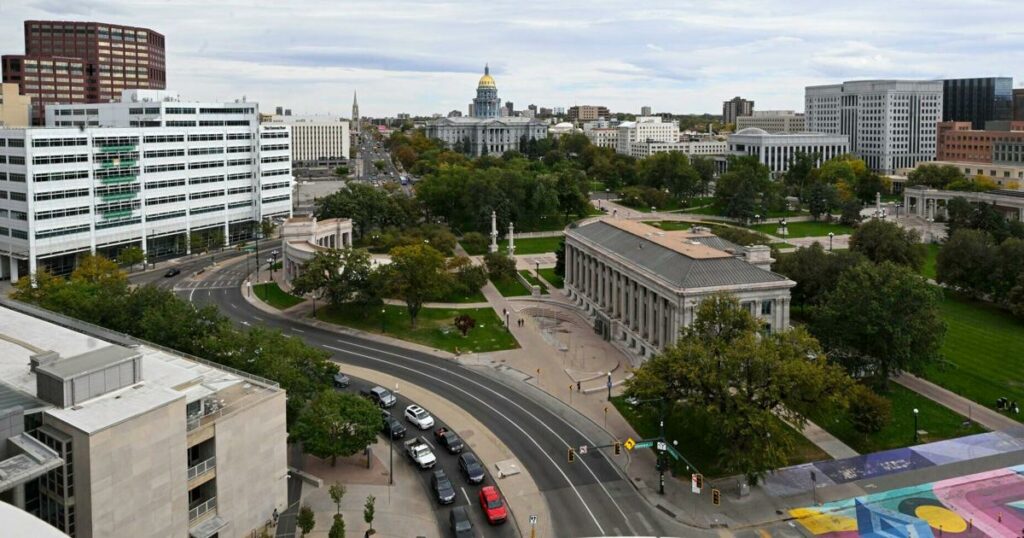As Colorado slips behind other states in terms of economic strength, its economy is projected to grow — albeit slower in 2025, according to a new report.
The Business Research Division at the University of Colorado Boulder released its 60th annual outlook Monday detailing forecasts of Colorado’s economy and various industries for 2025 based on the analysis from 140 statewide government, business and academic experts.
The report found Colorado’s economy is growing, but falling behind in several areas.
In fact, over the last 15 years, Colorado has been among the strongest economies in the U.S.
Not anymore.
“Slower growth, though, may be the new reality for Colorado as population growth, especially through net migration, remains slow, creating headwinds for labor force and job growth,” the report said.
Between 2008 and 2023, Colorado topped the country across major economic indicators. The state had the 5th fastest-growing gross domestic product (GDP) and employment growth, as well as the 3rd-fastest personal income growth rates in the country over the 15-year span. It also had the fastest-growing home appreciation.
But in 2024, the state’s growth slipped in the rankings.
At times, Colorado performed near the national average or in the bottom half. Researchers for the economic outlook said while Colorado is among the top states over the “medium-term,” its economy has slowed over the short-term.
“In Colorado, we have gotten a little bit used to being a leading state,” said Senior Economist Richard Wobbekind of CU Boulder’s Leeds School of Business.
“However, growth is moderate for many of these metrics making Colorado appear a little bit more average,” he added.
Colorado has dropped to the bottom 10 states for real GDP (No. 41) and home price growth over 2024 (No. 49). And it was among the bottom 20 for personal income and unemployment.
Colorado was a leader in the U.S. economy following the 2008 financial crisis and so, some surmised, it could also be leading in a national slowdown.
Colorado’s growth slowing in 2024 but not as much as expected, economists say
“Perhaps we just got there first and perhaps other states will follow this slowing trend,” Wobbekind said.
Still, Colorado is outperforming the national average across jobs (No. 9), population (No. 17) and pay (No. 18).
In this slowing economy, Wobbekind added that creating, retaining and recruiting a talented workforce will be “critical as we go forward in the decades ahead.”
Job growth
The outlook projected Colorado’s economy will see 1.2% job growth next year, adding approximately 36,700 jobs.
It’s slower than 2024, with preliminary estimates showing 1.6% growth and the addition of 46,800 jobs.
Out of Colorado’s 11 largest industries, 10 are expected to add jobs next year.
Senior Economist Richard Wobbekind presents the University of Colorado Boulder Colorado Business Economic Outlook 2025 at the Grand Hyatt hotel in Denver on Monday.
Bernadette Berdychowski, the Denver Gazette
The information sector is the lone industry in Colorado expected to see significant jobs losses, as telecommunications and software publishing companies continue to see declines into 2025, the report found. It cited the rapid adoption of artificial intelligence, a saturated market and shifting consumer preferences for contributing to job losses.
The forecast projects education and health services will add the most jobs next year due to an aging population and growth in private education services. The natural resources and mining sector is expected to have the fastest job growth in 2025.
Uncertainties and risks for next year
Inflation, growing consumer debt and the high cost of living continue to be risks across Colorado’s economy.
But one of the biggest questions surrounding 2025 is how President-elect Donald Trump’s policies will affect Colorado’s economy.
The committee behind the economic outlook made its assessment with the assumption Trump will keep his campaign promises to push tax cuts, implement tariffs and deport immigrants who are in the country illegally, the report said.
It’s unclear, though, how he will implement many of his proposed initiatives and at what scale, the CU Boulder researchers said, adding tax cuts could boost demand quickly but their effects hinge on how many cuts are placed and how it’s financed. Tariffs could cause supply chain impacts and inflationary pressures, but some are also on a “country-to-country” basis, depending on what negotiations are worked out.
The largest uncertainty revolves around Trump’s deportation plan. He has vowed to enact “Operation Aurora” — the campaign to crack down on illegal immigration and deport foreign gang members named after Colorado’s third most populous city.
The report said the effect of Trump’s new immigration policies could put pressure on Colorado’s already tight labor market.
Overall, Colorado’s labor market is still a concern for economists who are worried the tight market is hindering the state’s growth as the state’s aging population is retiring.
Colorado businesses starting to feel good about the economy again, report shows
Colorado’s Worker Shortage Index shows the state has eight available workers for every 10 job openings — the 12th-highest nationwide.
Wobbekind said Colorado has a greater imbalance of job openings and unemployment compared to the rest of the nation.
“If you were able to match every unemployed person in Colorado — regardless of industry, skill, education, demographic preference, income demands and so on — it would still not be enough workers in the state,” the economist said.
Source link : http://www.bing.com/news/apiclick.aspx?ref=FexRss&aid=&tid=6757ebdf946f4f24950bc77dd9319d97&url=https%3A%2F%2Fgazette.com%2Fnews%2Fcolorado-economy-projected-2025%2Farticle_e123eddb-25a8-56db-a776-6b3da0f1a7f2.html&c=17819113318524012674&mkt=en-us
Author :
Publish date : 2024-12-09 09:31:00
Copyright for syndicated content belongs to the linked Source.
